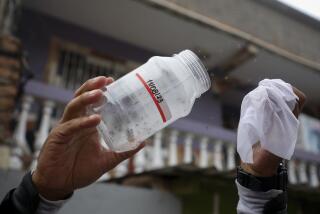Rice vaccine shows promise in cholera battle
- Share via
Japanese researchers have developed a genetically engineered rice that protects against cholera, offering the hope of an inexpensive, easily stored vaccine that could make a major impact against diseases in Third World countries.
The research, carried out by Hiroshi Kiyono and colleagues at the University of Tokyo, was published online this week in the Proceedings of the National Academy of Sciences.
The rice was engineered to produce a portion of the cholera toxin protein in the grains. Mice that ate the powdered rice did not get sick when later fed complete cholera toxin.
Injected vaccines are not typically effective for diseases of the digestive system, such as cholera. Kiyono and his coauthors designed their vaccine to target mucous membranes such as in the nose and mouth, where more than 90% of infectious agents enter the body.
This new system for making vaccines, MucoRice, could also potentially be used to fight diseases including anthrax and the flu.
Since 1990, scientists have been working on vaccines based on plants, such as tobacco, potatoes and corn. However, those vaccines are tricky because the vaccine may cause an allergic reaction to the food, or it may be digested too quickly to stimulate an immune response.
“This is the first time anyone has used rice,” said Charles Arntzen, a plant biotechnologist at Arizona State University. “Rice is particularly useful because it is a well-tolerated food crop and it is digested slowly.”
Kiyono and his colleagues found that their rice-based vaccine did not cause an immune response to rice proteins and it was digested slowly enough to allow immunity to develop.
Most vaccines must be kept cold during storage and transport, which makes delivery to developing nations expensive. The cost to keep vaccines chilled is estimated at $200 million to $300 million each year. In contrast, the rice-based cholera vaccine was still effective after more than a year stored at room temperature.
Such a vaccine would probably be available as a tablet or capsule containing powdered rice. This would reduce the medical waste -- and patients’ pain -- associated with needles.
“Rice-based vaccine is a human- and environment-friendly vaccine,” Kiyono said.





